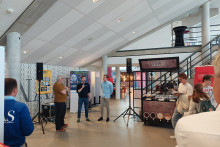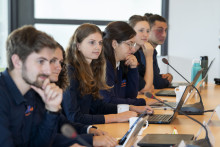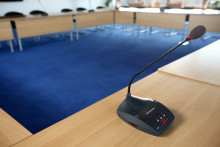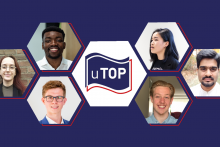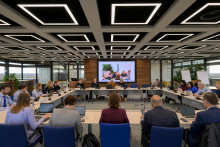While many a Waaier visitor is mainly concerned with his or her lunch that day, a clump of participation intimates and a few listeners are a little further away. At a quarter to one, University Council chairman Herbert Wormeester opens the debate – or rather: panel discussion. Why people should vote, he asks party leaders Robin Kamphuis and Oliver Davies of student parties DAS and UReka. ‘It's an opportunity for people to make sure they're represented,’ Davies replies. And Kamphuis, hyperbolic: 'If no one votes, we don't represent anyone.'
Long-term fines and UT finances
Moving on to the pressing issues, what does the University Council deal with? Wormeester asks the question, while not much later six pro-Palestine demonstrators march across the O&O square. Kamphuis and Davies are in complete agreement on the urgent issues for the participation bodies: the long-term studying fine and its consequences for activism at the UT.
Employees Eline Marsman and Emile Dopheide, who are both standing for election on behalf of the Campus Coalition employee party, join the conversation and mention the financial state of affairs at the UT. Marsman expresses her concerns about the workload of employees now that the UT is making cutbacks, Dopheide insists on the importance of more clarity and structure for the community. Marsman nods. 'More guidance is needed, especially from the Executive Board. You can't say that we're all in this together, and then mainly leave the tasks to managers.'
Turnout so far
At the time of publication, the turnout for the student elections for the University Council was 14.9 percent. Among employees, the turnout is considerably higher, with 23.47 percent.
'Critical dissent'
Then there is the question from the audience about the greatest achievements of those involved; all 'panel members' are already members of the University Council. Kamphuis mentions increasing the FOBOS budget and a struggle to keep figures valid for longer. Davies is pleased with the short lines of communication with the constituency, in order to quickly solve urgent problems – opening hours of buildings or the payment of student assistants, for example.
Marsman and Dopheide are particularly pleased with how the University Council is dealing with the financial perils at the UT. 'I have the feeling that the Executive Board listens to us and that we act as a critical counter-voice,' says Dopheide. Marsman: 'I'm glad we've put the emphasis on communication. That communication doesn't just go to senior management. Or that UT students and staff only read about it on U-Today. But that people can also inform themselves about it via a central web page.’
Parliament
The most important common thread that emerges during the conversation is one under the heading of representation. After all, most Waaier visitors are still poring over their lunch, while a handful of people – mainly wearing a DAS or UReka outfit – listen to what the four participators have to say. So it's not surprising that at some point the UT representatives hold up a mirror to themselves on how best to represent people. The same people who largely ignore the panel discussion, even though they are within earshot.
The question comes up specifically when someone from the audience asks how international students can feel better represented. Davies recognizes the problem, but notes that someone can also approach a candidate to find out. Kamphuis goes one step further. 'You have to ask yourself whether you are only represented by someone if they are also part of a certain group. Frans Timmermans is not a worker, is he? But he does represent the workers’ party and its ideology.'
During this UT-wide election week, UT students and staff can vote for candidates for the University Council and Faculty Councils. The election results will be announced on Friday afternoon.


